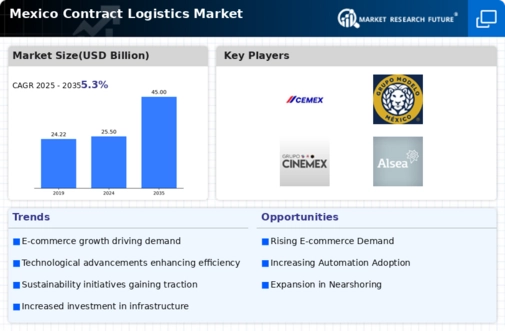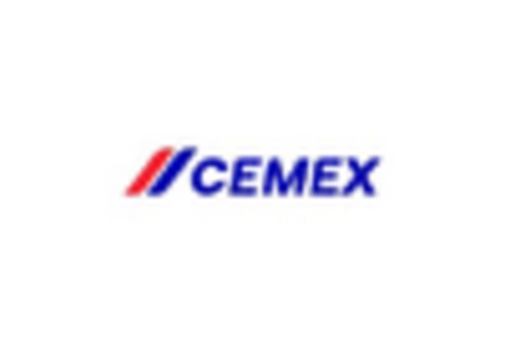The competitive dynamics within the contract logistics market in Mexico are characterized by a blend of innovation, strategic partnerships, and regional expansion. Key players such as DHL Supply Chain (DE), Kuehne + Nagel (CH), and XPO Logistics (US) are actively shaping the landscape through their operational focuses. DHL Supply Chain (DE) emphasizes digital transformation and sustainability, aiming to enhance efficiency and reduce carbon footprints. Kuehne + Nagel (CH) appears to be leveraging its global network to optimize supply chains, while XPO Logistics (US) is concentrating on technology integration to streamline operations. Collectively, these strategies foster a competitive environment that is increasingly focused on technological advancement and sustainability.
In terms of business tactics, localizing manufacturing and optimizing supply chains are pivotal. The market structure is moderately fragmented, with several key players exerting influence. This fragmentation allows for a diverse range of services and solutions, catering to various sectors. The collective influence of these major companies drives innovation and competition, as they seek to differentiate themselves through enhanced service offerings and operational efficiencies.
In December 2025, DHL Supply Chain (DE) announced a partnership with a leading technology firm to develop AI-driven logistics solutions. This strategic move is likely to enhance their operational capabilities, allowing for more efficient inventory management and predictive analytics. Such advancements may position DHL Supply Chain (DE) as a frontrunner in the digital logistics space, potentially reshaping customer expectations and service delivery.
In November 2025, Kuehne + Nagel (CH) expanded its warehousing capacity in Mexico by acquiring a new facility in Querétaro. This acquisition is significant as it not only increases their operational footprint but also enhances their ability to serve clients in the automotive and aerospace sectors, which are critical to the Mexican economy. The strategic location of the new facility may facilitate improved logistics solutions and faster delivery times, thereby strengthening Kuehne + Nagel's competitive edge.
In October 2025, XPO Logistics (US) launched a new digital platform aimed at improving supply chain visibility for its clients. This initiative is indicative of a broader trend towards digitalization in the logistics sector, as companies seek to provide real-time data and analytics to enhance decision-making processes. By investing in such technology, XPO Logistics (US) is likely to improve customer satisfaction and operational efficiency, further solidifying its market position.
As of January 2026, current trends in the contract logistics market are heavily influenced by digitalization, sustainability, and AI integration. Strategic alliances are becoming increasingly important, as companies recognize the value of collaboration in enhancing service offerings and operational capabilities. Looking ahead, competitive differentiation is expected to evolve, with a notable shift from price-based competition to a focus on innovation, technology, and supply chain reliability. This transition may redefine how companies engage with clients and position themselves in the market.














